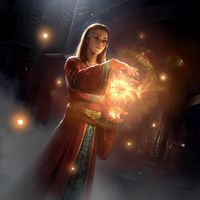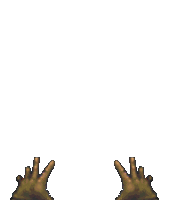Lore:Spells
The act of drawing on one's own magicka reserves in order to generate some kind of effect in the physical world is called "casting a spell". The Psijic Order consider it an intensely personal exercise. No two mages weave their spells in exactly the same way; like painting or sculpting, each artist has their own distinctive style.[1] Despite this, each culture does have its own general spellcasting habits. The Altmer tend to be fond of spectacle, Bretons lean towards "flamboyant gesticulations", Nords sometimes involve bellowing, whereas Redguards are frequently more reserved in their spellcasting.[2]
The arcanist Azandar al-Cybiades describes a spellcaster as a "willworker". A spellcaster changes reality using their own will and personality, and techniques are useful to ground their mind and thinking to help connect to magic. For example, incantations or hand-waving are methods which may help ease the mental and physical burden of a spell being cast.[3]
Schools[edit]
There have been seven widely accepted schools of spellcasting over time, each with a number of spells that pertain to its particular purpose:
- Destruction spells harm the target by damaging its health with either elemental or magical attacks, draining and damaging its attributes, skills, health, magic, and fatigue, making it weak to the elements, poisons and magic, and corroding its armor and weapons.
- Restoration spells augment the target by restoring its health, attributes, stamina, and magicka, fortifying its health, attributes, skills, stamina, and magicka, granting it resistances to the elements, magic, disease, paralysis, poison, and un-enchanted weapons, curing it of disease, poison, and paralysis as well as harming the target by absorbing its health, magicka, stamina, attributes, and skills.
- Conjuration spells call upon otherworldly entities through telepathy, certain skilled Conjuration mages can develop telepathic links with each other. Conjuration spells augment the caster by granting them Daedric and Undead guardians, Daedric weapons and armor, and the ability to repel the undead and banish Daedra.
- Alteration spells alter the physical and magical properties of the target. Alteration spells harm the target by making the objects it is carrying heavier and augments the target by making the objects it is carrying lighter, granting it elemental and physical shields and the ability to breathe water and walk upon its surface as well as open locks.
- Illusion spells affect light and a sentient target's mind. Illusion spells harm the target by commanding, demoralizing, paralyzing, silencing, and causing it to frenzy, as well as augmenting it by rallying, charming, calming it, granting it invisibility, night-vision, translucency, and illuminating it.
- Mysticism is an obscure school, though its spells seem to manipulate magicka itself. Due to its spells that bind the target's soul, this school is closely related to necromancy. Mysticism spells augment the target by granting it the ability to detect life, reflect damage, absorb and reflect spells as well as harm it by dispelling its magical effects and trapping its soul, including the ability to move objects through space with telekinesis. The nature of the School of Mysticism is the subject of much scholarly debate.[4]
- Thaumaturgy does not change the appearance or structure of a force or object, but can manipulate laws temporarily.
The schools of magic have often been subject to revision by existing magical institutes, and some have fallen out of favor. For example, following the Warp in the West the school of Thaumaturgy was rearranged into other schools and was largely replaced by the growing popularity of Conjuration, while in the fourth era the school of Mysticism was gradually consolidated into the other five extant schools. Ultimately, the schools of magic are arbitrary and artificial constructs used to simplify the study of magic.[5][6]
Spellmaking[edit]
Spellmaking is the magical craft of creating new spells.[7] Spells taught at institutions of learning, known as circinate spells are standardized and more readily available. However, for more advanced practitioners of magic seeking more unique effects, spellmaking is an option.[8][9] Spells were sometimes named after their creators, such as Merien's White Mask devised by Merien Sellan of Eagle's Brook,[10] or Shalidor's Mirror created by the legendary Arch-Mage Shalidor.[11][12]
Gallery[edit]
References[edit]
- ^ Loremaster Celarus' dialogue in ESO: Summerset
- ^ Wind and Sand — Afa-Saryat
- ^ Loremaster's Archive - The Arcanists
- ^ Mysticism — Tetronius Lor
- ^ The Black Arts On Trial — Hannibal Traven, Archmagister of the Mages Guild
- ^ Proposal: Schools of Magic — Gabrielle Benele, Daggerfall Mages Guild
- ^ Spell Making in Oblivion
- ^ Dialogue during Banish Daedra in Daggerfall
- ^ Daggerfall User's Guide
- ^ Tamien Sellan, and Merien Sellan's dialogue in ESO
- ^ Shalidor's Mirror effect in Morrowind
- ^ Arch-Mage Shalidor's dialogue in ESO

